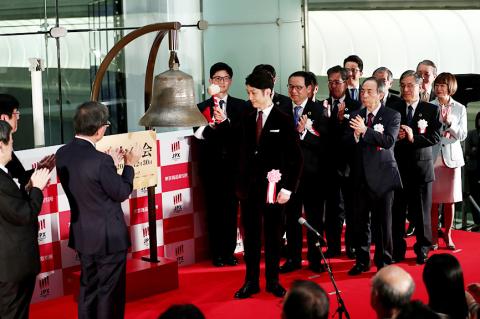Tokyo’s benchmark Nikkei 225 finished more than 18 percent higher over the year, bolstered recently by hopes for progress in US and China trade talks.
In the final trading session of the year, the bellwether index closed at 23,656.62, an 18.2 percent gain compared with its closing price at the end of last year.
The broader TOPIX gained more than 15 percent over the year, as the Tokyo markets close until Monday next week.

Photo: AFP
The Nikkei got off to a bad start this year, with sharp declines following its first annual loss since 2011, when a massive earthquake and tsunami hit the world’s third-largest economy.
The market since then has been dominated by the trade dispute between the world’s top two economies, the US and China, resulting in “seesaw trade,” Daiwa Securities Capital Markets chief technical analyst Eiji Kinouchi said.
Over the past few weeks, Japanese shares have enjoyed sizable gains, following US stocks to new highs and reflecting investor relief over a recent thaw in US-China trade ties.
“The primary focus of the market next year is the US presidential election,” Kinouchi said. “This will also affect prospects for the US-China trade negotiations.”
The Nikkei yesterday lost 0.76 percent and the TOPIX fell 0.68 percent as investors cashed in ahead of the New Year holidays, with thin trading.
“Many investors are taking nine straight days of holidays, including today,” which resulted in light volumes, Okasan Online Securities Co said in a note.
Elsewhere in Asia, markets were mixed with activity thinning as investors wind down for the end of the year, with lingering optimism over easing US-China trade tensions driving some gains.
Hong Kong finished up 0.3 percent, while Shanghai was more than 1 percent higher.
Taipei, Sydney, Jakarta and Manila were also marginally down.
“Investors appear to be growing a tad apprehensive about chasing the record setting US equity market risk-reward premise into year-end,” Stephen Innes, chief Asia market strategist at AxiTrader said in a note.

The demise of the coal industry left the US’ Appalachian region in tatters, with lost jobs, spoiled water and countless kilometers of abandoned underground mines. Now entrepreneurs are eyeing the rural region with ambitious visions to rebuild its economy by converting old mines into solar power systems and data centers that could help fuel the increasing power demands of the artificial intelligence (AI) boom. One such project is underway by a non-profit team calling itself Energy DELTA (Discovery, Education, Learning and Technology Accelerator) Lab, which is looking to develop energy sources on about 26,305 hectares of old coal land in

Taiwan’s exports soared 56 percent year-on-year to an all-time high of US$64.05 billion last month, propelled by surging global demand for artificial intelligence (AI), high-performance computing and cloud service infrastructure, the Ministry of Finance said yesterday. Department of Statistics Director-General Beatrice Tsai (蔡美娜) called the figure an unexpected upside surprise, citing a wave of technology orders from overseas customers alongside the usual year-end shopping season for technology products. Growth is likely to remain strong this month, she said, projecting a 40 percent to 45 percent expansion on an annual basis. The outperformance could prompt the Directorate-General of Budget, Accounting and

Netflix on Friday faced fierce criticism over its blockbuster deal to acquire Warner Bros Discovery. The streaming giant is already viewed as a pariah in some Hollywood circles, largely due to its reluctance to release content in theaters and its disruption of traditional industry practices. As Netflix emerged as the likely winning bidder for Warner Bros — the studio behind Casablanca, the Harry Potter movies and Friends — Hollywood’s elite launched an aggressive campaign against the acquisition. Titanic director James Cameron called the buyout a “disaster,” while a group of prominent producers are lobbying US Congress to oppose the deal,

Two Chinese chipmakers are attracting strong retail investor demand, buoyed by industry peer Moore Threads Technology Co’s (摩爾線程) stellar debut. The retail portion of MetaX Integrated Circuits (Shanghai) Co’s (上海沐曦) upcoming initial public offering (IPO) was 2,986 times oversubscribed on Friday, according to a filing. Meanwhile, Beijing Onmicro Electronics Co (北京昂瑞微), which makes radio frequency chips, was 2,899 times oversubscribed on Friday, its filing showed. The bids coincided with Moore Threads’ trading debut, which surged 425 percent on Friday after raising 8 billion yuan (US$1.13 billion) on bets that the company could emerge as a viable local competitor to Nvidia